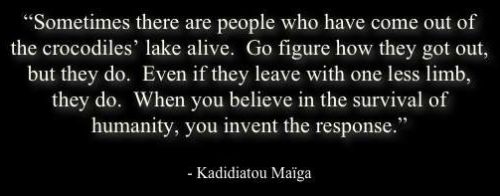Dama: A Vibrant Gift Economy In Mali

Tapan forwards a wonderful video on the Gift Economy:
Other World Productions, who produced this video, also lists some articulate explanations of how the gift-economy works in Mali:
Gifts economies, in which human beings are worth more than the market, are fundamental to most traditional and indigenous peoples. Here is a case where a just alternative already exists, and has for thousands of years.
In its purest form, the gift economy is about the collective, allocation based on need, and abundance. Behind gifting is human relationship, solidarity, generation of goodwill, and attention to the nurturance of the whole society, and not just one’s immediate self and family. Maintaining economic and social relations outside of the market keeps respect, cooperation, and ethics thriving.
One of these gift systems is alive and well in Mali, West Africa.
Called dama, this is a vibrant economy and culture propagated primarily through a strong, though informal, women’s social network. Gift-giving is not based on exchange or equivalence between giver and receiver. She who receives a gift will probably pass it on to someone else. Another person entirely, somewhere down the line, will give back to the original giver. Dama involves return, but from within a broadly defined community to which the gift has moved on. Gift-giving holds the expectation that just as you care for and provide for others, someone else altogether will care and provide for you or your family.
The circulation of gifts acts as the warp and weft of community, weaving together multiple layers of loyalty and history. A gift is a string that creates and strengthens friendships, family, regional community, religious grouping, and other social networks. At its best, gifting reflects a worldview that society, indeed the world, is a web of relationships – not just between individuals, but among elements of an inseparable whole. Irreducible to give and take, gifting continually reinforces interconnectedness and the collective.
A second purpose of gifting is to sustain and celebrate the values of humanity - what is known in Mali as maaya, ‘human-ness’ or ‘being human.’ Djingarey Maïga, director of Women and Human Rights, says, “It’s the link with your neighbors, your parents, your relatives. If you can’t keep that link, you are not a human being.” A common Malian expression explains maaya:
“Life is a cord. We make the cord between ourselves, and you have to hold on to it. One should not drop the cord.”
Thirdly, dama is an essential strategy for keeping the community well. Gifting is a time-honored means of keeping away hunger, prolonged illness, and early death. Malians’ understanding of community is that it is only as strong as its parts, only as healthy as its members, so that only by all providing for each other will all survive and thrive. Wherever your gift ends up will be an important contribution toward everyone’s welfare.
Lastly, since one can’t simultaneously pass on and hoard (what many of us call save), giving also keeps inequality relatively flattened. While in the U.S. there is social reinforcement to accumulate as much as possible, with wealth and the wealthy often being revered, in Mali the cultural norm is to give away as much of your accumulation as possible, with generosity and the generous being most respected. “The only way you get to be rich is by disassociating yourself from other people. There’s no way to live in community, have family in the way that we understand family, and still be rich. There are so many children that you have to pay for schooling for, so many people that you have to buy medicines for,”11 says popular educator Coumba Toure. “People really start worrying about what kind of person you’ve become.”
Beyond Africa, gifting thrives in many parts of the underdeveloped and developed world – usually below the radar, unnoticed, non-quantified, and unarticulated.
And some excellent gift-economy quotes too:






Posted by Nipun Mehta on Apr 9, 2009



On Apr 13, 2009 Pancho wrote:
This is a planetary BAAM hermano! :-)
Beautiful. It is the Planetization the Ahimsa Revolution!
"In the silent Mondays I clearly hear a New World breathing... she is the reality of the emerging paradigm... in a quiet day, one can feel her gentle rhythmic song in our ears. "
Human-ness... Human-kind, be both. ;-)
Post Your Reply